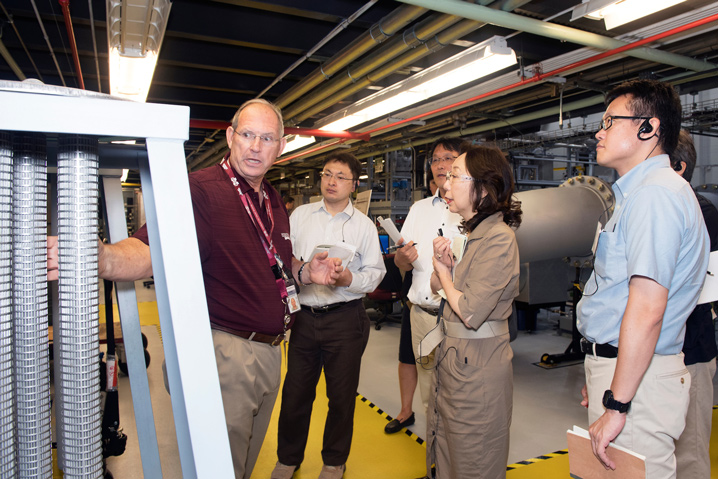
Contact: James Carskadon
STARKVILLE, Miss.—Mississippi State University’s Institute for Clean Energy Technology (ICET) was recently recognized by a global leader in engineering, procurement and construction for its work testing filters that contain airborne radioactive material.
ICET has been recognized as one of Bechtel Nuclear Security and Environmental Division’s four Large Business Subcontractors of the Year. A partner in Bechtel’s effort to build the world’s largest radioactive waste treatment plant for the U.S. Department of Energy, ICET contracted with the company to conduct tests of high-efficiency particulate air (HEPA) filters. HEPA filters are used in the ventilation systems of nuclear facilities to prevent the release of air with radioactive material into the atmosphere.
At the Hanford Waste Treatment and Immobilization plant in southeastern Washington State, HEPA filters tested at MSU will be used in the plant’s three nuclear processing facilities. Existing and new designs of HEPA filters are tested to ensure they meet standards set by the American Society of Mechanical Engineers and can also withstand worst-case conditions. Mississippi State’s ICET is the international leader in evaluating the performance of HEPA filters used in nuclear containment ventilation systems.
ICET’s Director Charles Waggoner said ICET has a unique set of qualifications for testing fragile HEPA filters.
“Our test stands have been developed to test filters to failure using facility-specific worst case challenge conditions,” Waggoner said. “Additionally, our laboratory is the only facility in the country that has been qualified by the Department of Energy and Bechtel National to provide test results meeting quality assurance requirements of the American Society of Mechanical Engineers Nuclear Quality Assurance-1 code.”
The Hanford Waste Treatment and Immobilization Plant will transform 56 million gallons of nuclear waste stored in 177 underground tanks into solid, stable glass that can be stored permanently and safely. MSU experts have been testing HEPA filters planned for use at the site by simulating normal operation conditions and adverse conditions such as earthquakes or fires.
“We could not accomplish what we do without our subcontractors and suppliers,” said Barbara Rusinko, president of Bechtel’s Nuclear, Security and Environmental global business unit in a release announcing the supply chain awards. “The work is challenging, highly technical, and is often first-of-a-kind.”
ICET, a unit of MSU’s Bagley College of Engineering and a part of MSU’s Energy Institute, has been working with the U.S. Department of Energy for almost 20 years to develop the capability of testing filters under worst-case scenario conditions. Jaime Rickert, ICET’s research program manager and quality assurance manager, implemented a nuclear quality assurance program at ICET that meets Department of Energy standards. Data gathered by ICET researchers is used by the Department of Energy to determine what, if any, changes need to be made to filters at nuclear facilities.
Bechtel is a leading provider to the U.S. and allied governments and the commercial nuclear power industry. Successful work includes many large, complex projects in site management, construction, environmental restoration, defense, energy, and national security. For more, visit www.bechtel.com.
For more on MSU’s Institute for Clean Energy Technology, visit icet.msstate.edu.
MSU is Mississippi’s leading university, available online at www.msstate.edu.